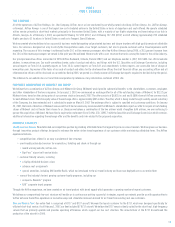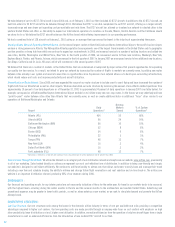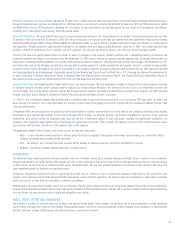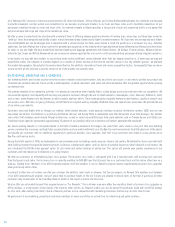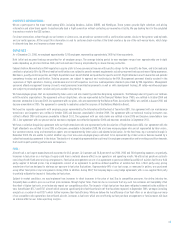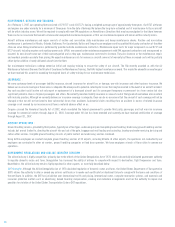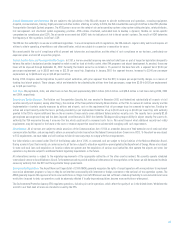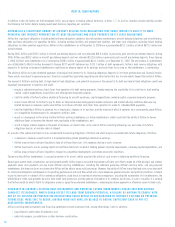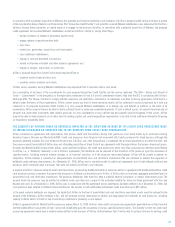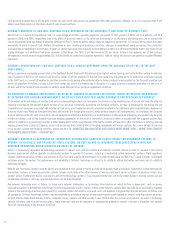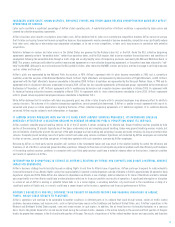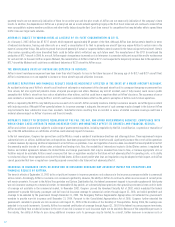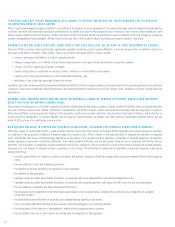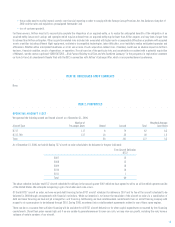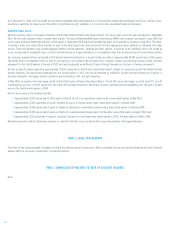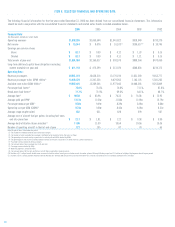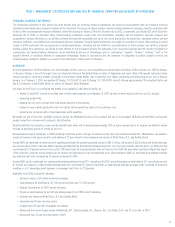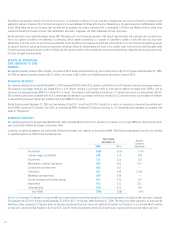Airtran 2006 Annual Report Download - page 16
Download and view the complete annual report
Please find page 16 of the 2006 Airtran annual report below. You can navigate through the pages in the report by either clicking on the pages listed below, or by using the keyword search tool below to find specific information within the annual report.
card processing agreements or will be able to enter into new credit card processing agreements with other processors, although it can not assure you that it will
always have these options in the future should it seek to exercise them.
AIRTRAN’S BUSINESS IS, AND WILL CONTINUE TO BE, DEPENDENT ON THE AVAILABILITY AND PRICE OF AIRCRAFT FUEL.
Aircraft fuel is a significant expenditure and, as a percentage of AirTran’s operating expenses, accounted for 36.5 percent in 2006 and 32.4 percent, and 24.8
percent in 2005, and 2004, respectively. Due to the effect of economic events on the price and availability of oil, the future availability and cost of aircraft fuel
cannot be predicted with any degree of certainty. Although AirTran is currently able to obtain adequate supplies of aircraft fuel, it is impossible to predict the future
availability or price of aircraft fuel. Political disruptions or wars involving oil-producing countries, changes in government policy concerning the production,
transportation or marketing of aircraft fuel, changes in aircraft fuel production capacity, environmental concerns and other unpredictable events may result in fuel
supply shortages and additional fuel price increases in the future. For 2007, if jet fuel increased $1 per barrel, AirTran’s fuel expense, net of fuel contract
arrangements, would increase approximately $9.3 million based on current and projected operations, without taking into account any potential acquired Midwest
operations.
AIRTRAN’S OPERATIONS ARE, AND WILL CONTINUE TO BE, LARGELY DEPENDANT UPON THE AVAILABILITY OF FUEL IN THE GULF
COAST AREA.
AirTran’s operations are largely concentrated in the Southeast United States with Atlanta being the highest volume fueling point in the AirTran system. In addition,
over 70 percent of AirTran’s fuel contracts are based on prices of jet fuel produced in the Gulf Coast area. Any disruption to the oil production or refinery capacity
in the Gulf Coast, as a result of weather or any other disaster could, among other potential effects, have a material adverse effect on the financial condition and
results of operations of AirTran, not only in East Coast routes but across the network due to disruptions in supply of jet fuel, dramatic escalations in the costs of
jet fuel, and/or the failure of fuel providers to perform under fixed-price fuel purchase agreements of AirTran.
WE ENDEAVOR TO MANAGE AND MITIGATE THE RISKS OF CHANGES IN AVIATION FUEL PRICES, WHERE WE BELIEVE APPROPRIATE,
BY ENTERING INTO HEDGING ARRANGEMENTS. WE DO NOT ENTER INTO FUEL HEDGE CONTRACTS FOR SPECULATIVE PURPOSES.
To the extent we do not hedge our aviation fuel risk or correspondingly adjust our fare levels, fluctuations in the market prices of jet fuel will have the effect of
reducing or increasing the amount of profit we earn or loss we incur. Conversely, by entering into hedging contracts, we may, in exchange for minimizing the risk
of potential cost increases associated with aviation jet fuel costs, also thereby necessarily minimize the potential for additional gain associated with decreases in
the price of such fuel. While we have generally been able to enter into hedging transactions when we have sought such arrangements, no assurances can be given
that our ability to enter into such transactions will not adversely be affected in the future by (i) limited interest in the provision of hedging arrangements by financial
or other institutions, and (ii) the inability to procure hedging agreements as the result of some crisis (financial or other) associated with the supply of aviation fuel,
political instability in oil producing countries or other developments which have otherwise affected the interest of financial or other institutions in entering into fuel
hedging transactions in general. Likewise, we can not assure you that counter parties to hedging agreements will always perform. For a more detailed discussion
of our current aviation fuel hedging activities, please see Item 7A “QUANTITIVE AND QUALITATIVE DISCLOSURES ABOUT MARKET RISK—MARKET RISK SENSITIVE
INSTRUMENTS AND POSITIONS—AVIATION FUEL.”
AIRTRAN’S BUSINESS IS DEPENDENT ON TECHNOLOGY. AIRTRAN WILL CONTINUE TO RELY HEAVILY ON AUTOMATED SYSTEMS TO
OPERATE ITS BUSINESS. ANY FAILURE OF THESE SYSTEMS, OR THE FAILURE TO INTEGRATE THEM SUCCESSFULLY WITH ANY
ACQUIRED OPERATIONS COULD HARM THE BUSINESS OF AIRTRAN.
AirTran is increasingly dependent on technology initiatives to reduce costs and to maintain and enhance customer service in order to compete in the current
business environment. AirTran depends on automated systems to operate its business, including computerized airline reservation systems, flight operations
systems, telecommunication systems and websites. AirTran has made significant investments in its website technology and Bye-Pass™check-in kiosks, and related
initiatives across the system. The performance and reliability of AirTran’s technology is critical to its ability to attract and retain customers and its ability to
effectively compete.
Website and reservation systems must be able to accommodate a high volume of traffic and deliver important flight information. Substantial or repeated website,
reservations systems or telecommunication systems failures could reduce the attractiveness of services and could cause customers to purchase tickets from
another airline. Furthermore, AirTran may need to utilize the technology systems of any acquired entity from and to the extent AirTran’s existing systems are not
immediately scalable or until any acquired operations can be fully integrated.
Any internal technology error or failure, or large scale external interruption in technology infrastructure on which AirTran is dependent, such as power,
telecommunications or the Internet, may disrupt its technology network, result in the loss of data or the failure to capture data. Any individual, sustained or repeated
failure of the technology of AirTran could impact its customer service and result in increased costs and expenses and generally harm the business of AirTran. Like
all companies, AirTran’s technology systems may be vulnerable to a variety of sources of interruption due to events beyond its control, including natural disasters,
terrorist attacks, telecommunications failures, computer viruses, hackers and other security issues. While AirTran has in place and continues to invest in technology
security initiatives and disaster recovery plans, these measures may not be adequate or implemented properly to prevent a business disruption and adverse
financial consequences to the business of AirTran.
10



